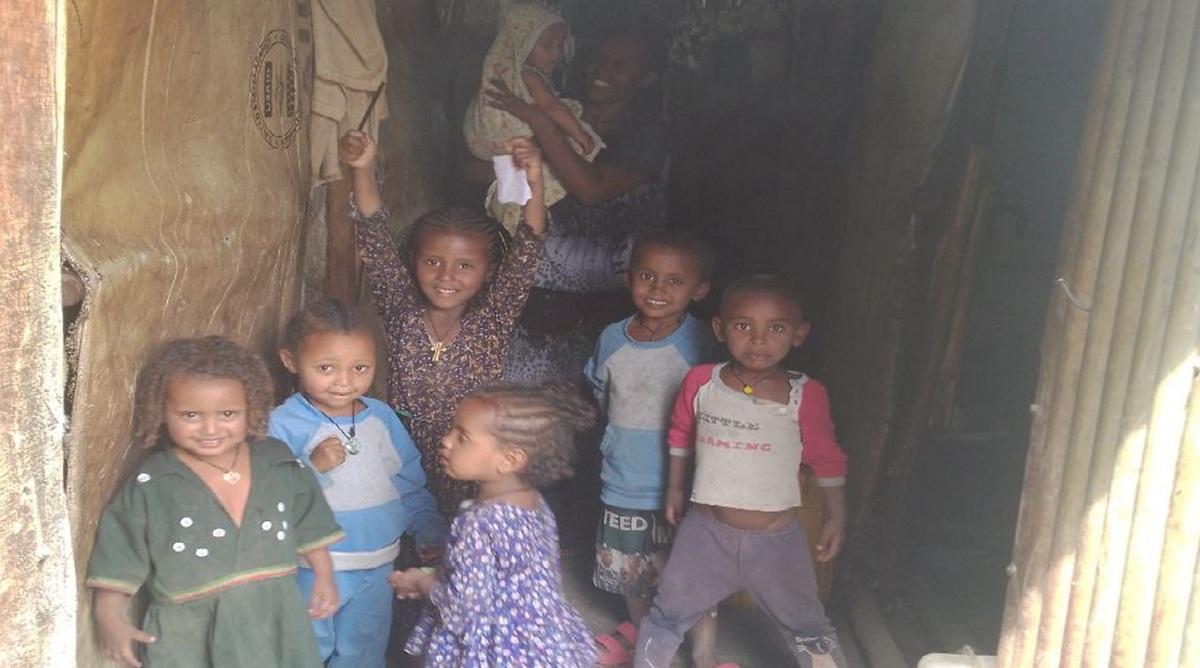Africa-Press – Ethiopia. October 9, 2025 3 minutes read Addis Abeba- Displaced people from East Wollega Zone, Oromia region, who have sought refuge near Sekota town in the Wag Hemra Nationality Administration of Amhara region, said they are facing severe hardships, including food shortages.
One displaced man, who requested anonymity for security reasons, told Addis Standard that he fled Alem Seye Kebele, Gudu Soyo Woreda, East Wollega Zone, after inter-communal violence erupted on 20 October 2021. “I owned about three hectares of farmland and ten cattle. I left everything behind. After taking our property, they burned our house. It happened on a Friday — we fled to the mountains and watched our home burn from afar,” he said.
He recalled that the conflict forced many residents to flee, with some seeking safety in Addis Abeba and Debre Birhan. “But since I’m originally from Wag Hemra, I came back to my birthplace,” he said. The 60-year-old man explained that he had lived in East Wollega since 1985. “Now, after forty years, I have returned to my ancestral land,” he added.
Currently living in a makeshift settlement in a place called “Mai Gulit,” near Sekota, he described his situation as moving “from hardship to misery.” “We haven’t received adequate assistance. Monthly support would have helped, but now we sit idle, forgotten by our country,” he lamented.
A father of seven, he said some of his children have left in search of food. “Every three or four months, we get only 25 kilograms of flour, which is not enough,” he said, adding that he is ill and unable to work. “Even if we ask for electricity or basic services, no one listens. We’re told the plan is to return us to our original homes,” he added.
He questioned, “Are we not citizens? Why do we suffer from hunger and thirst? We are silent because there’s no solution. We’ve reached a point where we regret being alive. We lost everything from our fertile land — the government should have at least asked where its citizens have gone.”
Another displaced person who fled East Wollega during the same 2021 violence told Addis Standard that life in “Mai Gulit” is extremely difficult. “We live packed inside a warehouse,” he said, recalling that he used to cultivate mangoes, bananas, coffee, and enset on five hectares of land before the sudden attack forced him to flee empty-handed. A father of six, he added that the area faces severe shortages of food and medical care, forcing some of his children to leave in search of work.
A young man, identified as Mekuria Alemu (name changed for safety), said he first went to Addis Abeba after being displaced from Alem Seye Kebele, Gudu Soyo Woreda, but has now moved to Mai Gulit. The 26-year-old, whose wife is pregnant, described life there as unbearable. “There are no job opportunities. We are struggling. There are many youths like me here, but nothing to do. Even if we ask for work, we’re told to sit and wait. Living here is very hard,” he said.
He added that around 62 families share one large storage hall, while others rent small houses nearby.
Repeated attempts by Addis Standard to reach Mihret Melaku, head of the Wag Hemra Disaster Prevention and Food Security Office, for comment were unsuccessful.
A July report by the UN Office for the Coordination of Humanitarian Affairs (OCHA) stated that around 500,000 internally displaced people (IDPs) are sheltering in various parts of the Amhara region, facing “severe shortages of food, shelter, water, sanitation, health, and protection services.”
It added that around 90% of these IDPs live within host communities, while the rest are in temporary camps. The report cited over 22,000 IDPs in Debre Birhan and about 10,000 in the Jara camp alone.
OCHA, citing the Amhara Regional Disaster Prevention and Food Security Commission, said the displacement crisis in the region stems largely from multiple conflicts, including recurrent attacks in western Oromia.
Since 2021, more than 88,000 civilians have reportedly been forcibly displaced from western Oromia alone, with many now residing in camps in Debre Birhan (China Camp), Woyinchit, and Bachelo — areas described as severely lacking basic services. AS
TagsAmhara Region Ethiopia Sekota town Wag Hemra zone West Oromia Copy URL URL Copied October 9, 2025 3 minutes read Show More Facebook X LinkedIn Tumblr Pinterest Reddit VKontakte Share via Email Print
For More News And Analysis About Ethiopia Follow Africa-Press






